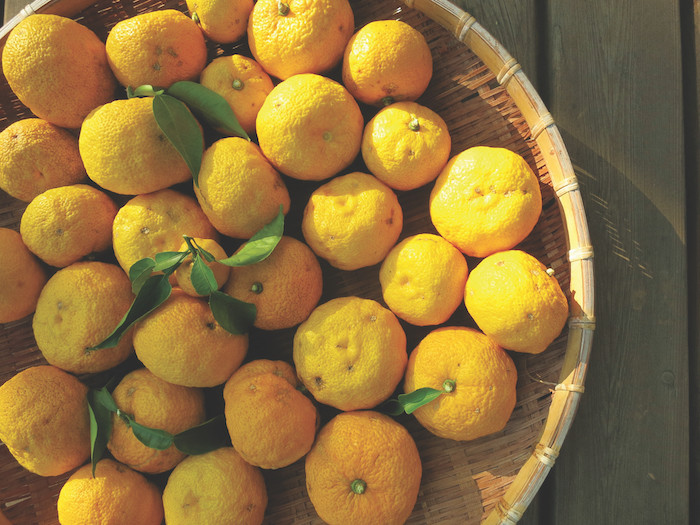
Laura Foster takes a deep dive into the delicious world of this Japanese fruit liqueur, which is creeping into cocktails across the UK.
What is it?
A few years ago, standing in a hot, cramped sake bar in Kyoto with Alex Davies of Ki No Bi distillery, I declared that I wasn’t in the mood for sake. What Davies handed to me was a pale yellow liquid in a glass brimming with ice; a zesty, bright and refreshing drink that slaked my thirst and was oh so moreish. It was yuzushu, and I have craved this drink ever since.
Yuzushu is part of a family of fruit liqueurs produced in Japan. The most famous liqueur is umeshu, based on the ume plum, while yuzushu runs a close second.
“The shu bit [of the name] really means booze, so you can make it out of any base alcohol, but by far the most common is made from what we call sake, and shochu. It might be a blend of the two, but shochu gives a longer shelf life,” explains Oliver Hilton-Johnson, director of sake importer Tengu Sake.
The yuzu can be added in a number of ways – yuzu juice can simply be blended with the base alcohol and some sugar, the fruit could be steeped in the liquid, or the whole fruit can be blended with the liquid and the resulting mixture filtered. This results in a whole range of mouthfeels and styles, ranging from the light, bright and watery, to the thick, intense and unctuous.
What’s out there?
There are numerous products available here, but for ease we shall focus on the products of two particular specialist importers in the UK market – Tengu Sake, and Umeshuya, a -shu fruit liqueur retailer that has recently set up a UK outpost.
Among Umeshuya’s wider stable are three really tasty yet very different propositions. There’s the Aotan No Yuzushu (8% abv), made by infusing yuzu juice in sake, resulting in a nose of sherbet lemon and Refresher bars, and a delicate palate of bright yuzu with a note of thyme. This seems perfect for using to make a low-abv highball, a refreshing summer option.
Mukashihanashi Teshibori Yuzushu (8.5%) is a mix of sake and rice shochu, into which yuzu juice is infused. It has a touch more body than the Aotan No, and a beguiling flavour profile of yuzu, orange, citrus pith and a hint of caramel.
A curveball comes in the form of Yuzu White (8%), which takes yuzu-infused sake and mixes it with a Japanese probiotic drink. The nose is reminiscent of Yeo Valley Lemon Curd yoghurt, while the medium-bodied, juicy palate is all lemon drizzle cake and candied citrus notes.
In Tengu Sake’s portfolio are Kodakara and Gozenshu yuzushus. Kodakara Yuzushu (8%) has a shochu base into which the yuzu juice – which is made with fruit from the Kochi prefecture, famous for the fruit – is blended. The nose is bright, pithy and sour, while the mid-weight palate is a delightful balance of sweet and sour, a clear yuzu flavour akin to a mix of lemon and lime juice and zest.
Gozenshu Yuzushu (9%) takes Rocky Mountain Junmai sake and whole yuzu fruit that is blended into the liquid, it has a bigger body and a deeper, richer flavour, reminiscent of marmalade and cooked lemons.
How to use it?
“In Japan, we always drink on the rocks, and especially with yuzushu, because it’s citrussy and refreshing people always drink it chilled. It can also be drunk mixed with water,” says Risa Iwashita, executive director of Umeshuya.
In the UK, however, yuzushu is gaining a reputation as an excellent cocktail ingredient. Cocktail menus across the land have recently come out in an outbreak of yuzu inclusions, but where ‘yuzu’ may be the ingredient that’s listed, you can bet your bottom dollar that the ingredient being used in that drink is actually yuzushu.
“In my opinion it’s a really universal ingredient that you can add to any citrus drink to elevate it. Take out 5ml of lemon and add 10ml of yuzushu,” declares Alastair Burgess, whose bar Happiness Forgets includes yuzushu in its bestselling Tokyo Collins. “Yuzu gives drinks an extra level of brightness and cleanliness that lemon, lime or grapefruit don’t. Yuzushu is fortified with sake and sugar, they’re more stable. If you were buying plain yuzu juice you can only buy it frozen, it’s salted for some reason, and it’s really, really expensive. So the best way to get the flavour of yuzu is to buy a yuzushu.”
I’m sure you don’t need to be told twice.


